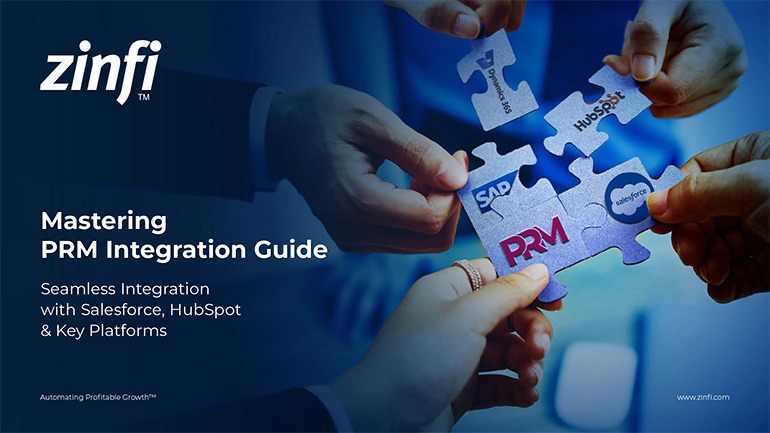Best Practices Articles

The Most Important Feature for Your PRM Software
The most recent trend in channel marketing automation has been the rapid deployment of Partner Relationship Management (PRM) Software along with Partner Marketing Management (PMM) capabilities in multiple industry verticals. In this article, we will focus specifically on the value of Partner Profile Manager (PPM) as a core feature for PRM Software.
Before we begin, let's discuss the rationale for using a Partner Profile Manager (PPM) and how it can help. The primary use for a Partner Profile Manager (PPM) in PRM Software is to make sure the vendor selling through the channel has detailed records for each partner company and their team members. This functions almost like CRM software, but with a lot more data and search capability associated with a specific partner profile. We have discussed earlier how partner profiling can boost channel sales. The main objective of the Partner Profile Management tool in PRM Software is to give a vendor the ability to profile or segment their partner on a dynamic basis, and use that segmentation data to take different business decision and actions. Partner Profile Management plays a very important role in PRM Software by helping users understand the following:- Firmographics of the partner company – This typically covers how many employees the partner company has, the key office locations, the market segments they serve, how long they have been in the business, what their credit rating is, etc. This information can be collected dynamically in the PPM tool of the PRM software from various database sources that are publicly available in most developed countries. In developing countries, this information will need to be pulled together manually from various sources, including telephone research and surveys.
- Business mix – Once you know who your partners are, the next most logical parameter for profiling is to understand their business mix – i.e., product versus services. A partner's ability to sell services directly depends on their ability to understand a specific vertical. As a result, partners who sell services also tend to specialize in certain verticals. These partners tend to work with a group of vendors and carry their solutions as a bundle. The right PRM Software can capture this information for you.
- Technical competence – A specific partner may sell into multiple industry verticals, such as healthcare, finance, insurance, real estate, manufacturing and education. If the product or solution the partner is selling varies by segment, then the partner will need specific marketing, sales and technical ability to sell that specific solution. It is crucial to dynamically track this data in PRM Software via the PPM tool.
- Sales velocity – One of the core capabilities of your PRM Software is the ability to access your point-of-sales data and dynamically show the sales velocity of your individual partners. Once you align this data with data about partner firmographics, business mix and technical competency, you will be able to see a storyline that will start making sense. Having this storyline allows you to differentiate partners by programs, capabilities, etc., so you can focus on partners with different storylines in different ways. This differentiated approach will not only help you increase your sales velocity, but will also enhance partner profitability by allowing them to differentiate from each other.
- Growth potential – Last but not least, the most important outcome of the partner profiling capability embedded in your PRM Software is continued engagement with your partner base, getting their feedback and linking feedback to their performance data to predict the growth potential of each and every one of your customers. You cannot control how a partner will run their business and where they will invest specifically. However, you can clearly lay out investment criteria by informing the partners what the rules of engagement are and where your organization is willing to invest to make them successful. Alignment of your program strategy via growth potential analysis is critical.
Keeping in mind these requirements that PRM Software can fulfill via its PPM capability, now we need to consider how to make this happen. This is a much-needed capability, especially as your channel grows, but it can provide truly significant insight even if you are dealing truly only with 50 to 100 partners. As we noted earlier, the primary goal should be to carry out the profiling in a dynamic way. For example, when your partners update their records (based on regular update requests or programs, etc.), those changes should be reflected dynamically in your PRM software. Up-to-date knowledge of your partner base is a critical competitive advantage, because it allows you to do more with less.
Certainly you can jump-start the profile activity manually by carrying out surveys, adding data from secondary databases like Hoover’s and so on, but the platform should allow you to do the profiling dynamically and keep your database fresh and up-to-date so that your channel sales organization can act quickly.
Here are the five core technical requirements that you must consider to make sure your PRM software is capable of providing you with dynamic Partner Profile Management:
- Dynamic data connectivity – In most developed countries, there are multiple business data providers like Dun & Bradstreet, Hoover’s, Data.com, etc. Today, most also provide a dynamic data connection interface, which, when properly integrated with your PRM software, pulls in your partner business information on a regular basis. This allows you to keep your firmographic data for your partner base up-to-date and current.
- Technical certification integration – If you are using a Learning Management System (LMS) then you should be able to connect your PRM software to your LMS module and dynamically populate the status of your partners.
- Point-of-sales data integration – There are various vendors in the marketplace who can provide you with this capability, but you can also do this manually by getting POS data from your distributors, organized by partner ID, in Excel format. As long as your PRM software allows you to upload POS data in an Excel data file, then you can update this once per quarter and see where your partners stand. This is an easy way to get you almost 95% of the way there.
- Manual research update – In addition to the dynamic data updates from various sources, you will also need to update your partner records via survey and telephone research. This can be done for the following areas:
a) Attitudinal & satisfaction research – This measures how your partners feel about various aspect of your business relationship with them.
b) Needs discovery research – This is primarily for scoping out new products and services ideas.
Once you have got the data from these two types of surveys, that information must be kept within your PRM software and Partner Profile Manager.
- Business planning – Last but not least: Ensure that as your channel management organization engages with your partners – especially the top-tier ones – and as they develop business plans, those data get synced back to your PRM software and its Partner Profile Manager
Any organization considering deployment of PRM software must carefully think through how it is going to increase its maturity across the channel management. Before an organization makes a significant investment in channel automation, their first step should be to build a Partner Profile Management infrastructure and management process around it. The right PRM software can not only enable the deployment, but also significantly streamline (and reduce costs for) day-to-day management, driving better decisions to achieve profitable growth. Proper deployment of Partner Profile Management capability can accelerate an organization’s understanding of the status of the channel, thereby allowing the organization to make the right investment decisions. This is the ultimate result of “doing the right things right.”
Best Practices Guidebook
 The Ultimate Guide to Partner Marketing Success Best Practices
The Ultimate Guide to Partner Marketing Success Best PracticesDownload Guide
 How to Start and Scale Partner Ecosystems Best Practices
How to Start and Scale Partner Ecosystems Best PracticesDownload Guide
 The Evolution of PartnerOps: Past, Present & Future Best Practices
The Evolution of PartnerOps: Past, Present & Future Best PracticesDownload Guide
 Mastering Channel Sales: Strategies, Best Practices, and Growth Tactics for 2025
Mastering Channel Sales: Strategies, Best Practices, and Growth Tactics for 2025Download Guide
 Winning with Partner Advisory Councils: Best Practices for Partner Engagement & Growth
Winning with Partner Advisory Councils: Best Practices for Partner Engagement & GrowthDownload Guide
 The Future of Partner Ecosystems Best Practices
The Future of Partner Ecosystems Best PracticesDownload Guide
 The AI Revolution: How Technology and Talent are Shaping the Future
The AI Revolution: How Technology and Talent are Shaping the FutureDownload Guide
 Top 105 Partner Management Metrics that Matter Best Practices
Top 105 Partner Management Metrics that Matter Best PracticesDownload Guide
 Mastering PRM Integration Best Practices
Mastering PRM Integration Best PracticesDownload Guide
 Building a Sales Partner Portal with Salesforce Best Practices
Building a Sales Partner Portal with Salesforce Best PracticesDownload Guide
 Building and Managing Partner Ecosystems Best Practices
Building and Managing Partner Ecosystems Best PracticesDownload Guide
 Mastering Co-Marketing and Co-Selling Best Practices
Mastering Co-Marketing and Co-Selling Best PracticesDownload Guide
 Transforming Partner Ecosystems Best Practices
Transforming Partner Ecosystems Best PracticesDownload Guide
 Mastering Partner Ecosystems Best Practices
Mastering Partner Ecosystems Best PracticesDownload Guide
 Mastering Partner Onboarding Best Practices
Mastering Partner Onboarding Best PracticesDownload Guide
 Partner Ecosystem Management Best Practices
Partner Ecosystem Management Best PracticesDownload Guide
 B2B Marketing in the Age of Intelligence Best Practices
B2B Marketing in the Age of Intelligence Best PracticesDownload Guide
 Multi-Partner Co-Selling Best Practices
Multi-Partner Co-Selling Best PracticesDownload Guide







